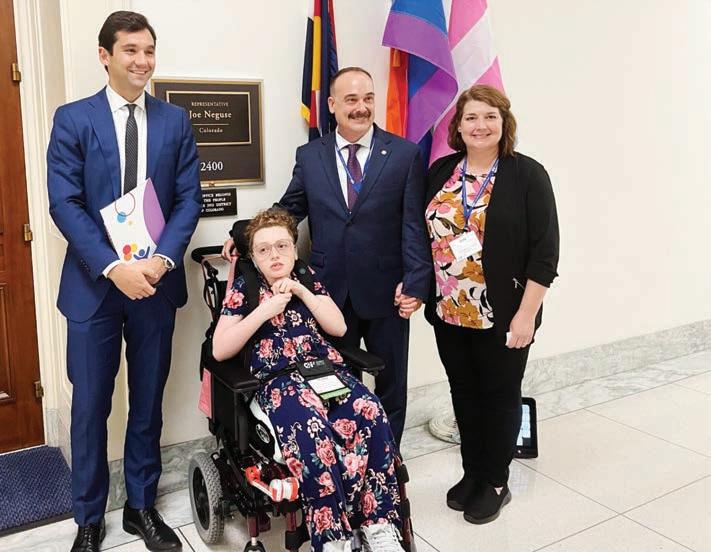
3 minute read
Miss Cummins goes to Washington
A Colorado teenager’s journey into D.C. lobbying
BY CAITLIN KIM COLORADO PUBLIC RADIO
On any given day, dozens of people visit their lawmakers on Capitol Hill to advocate for one cause or another — from energy policy to research projects to the Farm Bill. ey usually have very personal reasons for making the pitch. at was certainly the case for 19-yearold Maddy Cummins, and her parents, Amy and Matthew, when they came to Washington, D.C. for the rst time last week.
When she was two years old, Maddy was diagnosed with Rett Syndrome, a neurological disorder. She now gets around in a wheelchair and is non-verbal. She communicates with the help of an iPad-like device she operates with her eyes.
In between meetings, Maddy practiced. As her eyes icked across the boxes on the screen, the device recited, “Hi, I’m Maddy Cummins and I am representing Children’s Hospital Colorado.”
Around her neck was a nametag, with a green ribbon underneath with the words “I’m fearless” on it. e family spent two days traversing the Capitol complex to meet with sta from the entire Colorado congressional delegation as part of the Children’s Hospital Association’s Family Advocacy Day. At stop after stop, Maddy highlighted important issues to her: no cuts to Medicaid, support for pediatric mental health, and education and training for pediatric specialists, like the ones at Children’s Hospital Colorado who help her.
Maddy relies on Tricare — her father is retired from the Air Force — and Medicaid for all her medical needs, from her doctor’s visits and medication to her hospital bed at home.
“Without this coverage, it would make my life so much harder than it already is,” she said.
Maddy has been a patient ambassador for the hospital before, going to a Nuggets game (she’s a fan) and some golf tournaments. But never the U.S. Capitol.
Her father, Matthew, said when they were approached to make this trip, the family had to talk it over.
“We asked Maddy rst, ‘Are you up for this cause it’s going to be a challenging trip, with all the various medications and therapies and extra equipment we have to bring along with us?’,” Matthew said. “She [was] absolutely up for it. She wants to meet the challenge. She’s a tough girl and she wants to show what she can do.”
Maddy spent about a month working on what she’d say.
“I’m very excited to be here,” was one of her answers. “ ank you for listening to me. It’s important to continue funding for patients like me.”
She even threw in some political jokes. (“Where can kids vote? In swing states.” “How much does it cost to vote?” “You have to check the Bill of Rights.”)
Maddy’s mom, Amy, said at rst it was intimidating, walking into a senator’s ornate o ce. But by the end of their time on the Hill, her view had changed. “ is experience was amazing. I felt like they really wanted to hear about the daily life of Maddy and of children with medical complex needs in Colorado and where they’re lacking and where they’re succeeding.” e family of ve (Maddy has two younger siblings) chose to move to Colorado after Matthew left the military, in large part because of the health care and specialists Maddy would be able to access in the state. But they were also realistic about the challenges of getting all that they asked for. e Republicancontrolled House is looking to cut spending this budget go-round, so additional funding for pediatric care may be hard to come by.
“We know there are budgetary constraints, especially in today’s world,” said Matthew. “We’re aware of that, but we’re willing to help advocate in any way we can.”
After a grueling eight meetings on their second day, the family was worn out, but happy. Maddy was too tired to keep using her communication device. So instead she communicated with her eyes — looking directly at you for a yes, away for no.
“Maddy would you do this again? Would you want to come and lobby lawmakers again?” I asked. She quickly looked straight at me. For all the challenges, it was an unhesitating “yes.” e Colorado Public Radio story runs as part of a news sharing agreement with Colorado Community Media.
After telling Maddy’s story to lawmakers, the family left feeling they would at least try and help her and other kids like her.
Whether they’ll succeed, remains to be seen.












